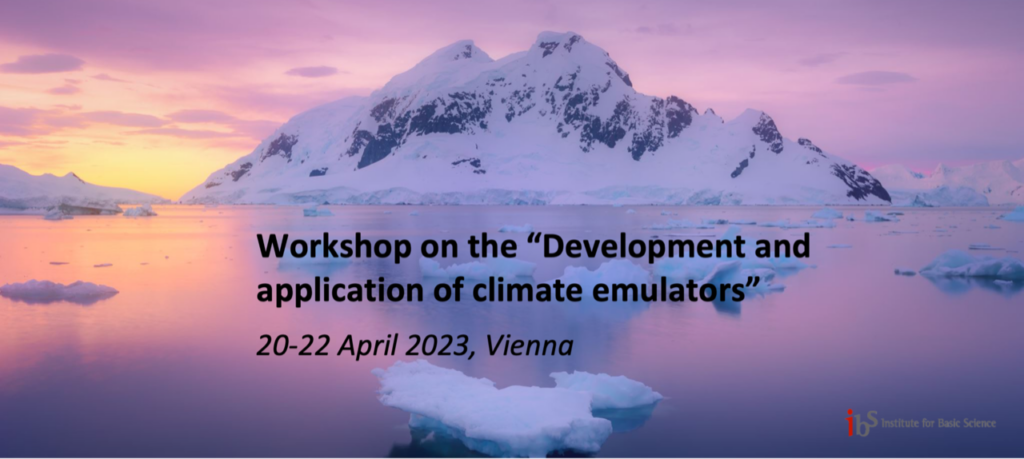Dates: 20 – 22 Apr, 2023
- Time: 20-22 April 2023, 1pm Thursday to 1pm Saturday
- Venue: Talent Garden, Liechtensteinstrasse 111-115, 1090 Vienna, Austria
- Tel.: +43 (0)1 2058183, Web: https://talentgarden.org/en/

Climate emulators hold the key to efficient and comprehensive impact assessment, scenario analysis and the design of climate policy. Despite their efficiency, they are possibly rather accurate emulators of state-of-the-art “Earth system models”, running at lightning speed on laptop computers, or, facilitating the generation of very large ensembles of simulations on supercomputers. Accuracy can be hampered – regionally at least – by bifurcations and other nonlinearities of the system. Coupling emulators with “Integrated impact assessment” models (IAM) or conceptual models of “tipping elements” of the climate system would facilitate impact and risk analysis in terms of economic development, the health of ecological systems, or worse. Due to their computational efficiency, they are well suited also to solve “inverse problems”, such as those for emission abatement or geo-manipulation required given (limited) commitments or technological abilities concerning one or the other. There are a number of approaches to emulator development; some require a specific experimental design and new climate model simulations, some aim at using existing, archived, e.g.. CMIP-X, simulation data.
We are seeking contributions to the workshop on the topics including but not exclusive of:
- Practical and theoretical advances in response theory;
- Development of climate emulators using response theory, AI, conceptual models (fitting), etc.;
- Performance assessment of emulators;
- Development and application of IAMs, ecological models;
- Game theoretical approaches to “optimizing”/predicting climate policy;
- Tipping point analysis via complex and conceptual models;
- Developments in the light of the Paris2015 targets.
The workshop is aimed at mapping the landscape of the state-of-the-art and current research trends in impact assessment and climate policy development; a review of the Paris2015 targets and developments since; and a lively and constructive debate on key and sensitive questions like modelling uncertainty, research into and practice of geo-manipulation, a.k.a. geoengineering or climate intervention, communicating risk and public outreach, consultation. We foresee high quality contributions from experts of their fields of research, crosspollination of ideas whether it is about approaches or synergic effects thanks to interdisciplinary collaborations. The workshop will showcase the climate emulator and underlying data sets being the outcomes of the Young Scientist Fellowship project “The FORced RESponse of the climate system: Towards efficient impact assessment”, FORRES. We will seek feedback from the participants on the potentials and room for improvement of these outcomes, while they are being offered for use by any interested party.
Confirmed speakers are:
- Michael Ghil, ENS, Paris
- Marcin Czupryna, Cracow University of Economics
- Nick Watkins, Univ. Warwick
- Chris Smith, IIASA, Vienna / Univ. Leeds / Met Office, Exeter
- Nico Wunderling, PIK, Potsdam
- David Stainforth, LSE, London
- Gábor Drótos, Atomki, Debrecen
- Valerio Lucarini, Univ. Reading
- Jonathan F Donges, PIK, Potsdam
- Robbin Bastiaansen, Univ. Utrecht
- Ben Sanderson, CICERO, Oslo
- Guilherme Mendonca, MPI-M, Hamburg
- Francesco Ragone, UCLouvian, Brussels
- Leeya Pressburger, PNNL, Seattle
Abstracts (interest of attendance) are (is) to be submitted (indicted) to Tamás Bódai (bodai@pusan.ac.kr) by 10 March. Late submissions are potentially considered pending on the saturation of the venue capacity.
We look forward to welcoming you atTalent Garden, Vienna, Austria, and sharing knowledge and fun during our event.
The organizers:
- Tamás Bódai, ICCP, Busan; MATE, Budapest; https://ibsclimate.org/people/tamas-bodai/
- Valerio Lembo, CNR, Rome; https://www.isac.cnr.it/it/users/valerio-lembo
- Sundaresan Aneesh, ICCP, Busan; https://ibsclimate.org/people/aneesh-sundaresan/
Note: The workshop receives funding form IBS, Korea, https://www.ibs.re.kr/eng.do